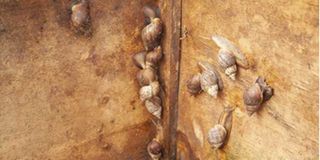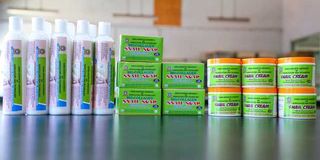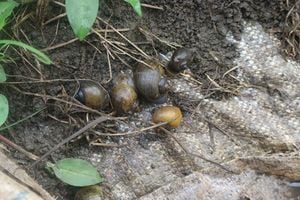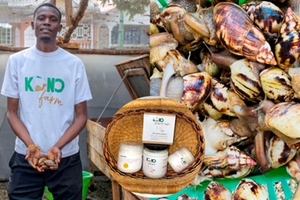
Dr Paul Kinoti, a lecturer in Crop Science in the Department of Horticulture and Food Security at Jkuat, is leading a transformation in snail farming.
Kenya is increasingly turning to snail farming as a promising alternative to traditional agriculture, providing both a food source and a new source of income for farmers.
Dr Paul Kinoti, a crop science lecturer in the Department of Horticulture and Food Security at the Jomo Kenyatta University of Agriculture and Technology (Jkuat), is spearheading the transformation of snail farming from a niche practice to a thriving industry.
His interest in snail farming was sparked by the growing global demand for snails as an entrepreneurial venture.
“Snails are valued for their nutritional, aesthetic, and medicinal benefits, and I believe that to fully optimise production and drive industry growth, intensive research and development are crucial to establishing a solid blueprint for the sector,” he says.
Dr Kinoti and his team are unlocking the untapped potential of snail slime, which is now being used in high-end skincare products that are attracting global attention.
They have positioned snail farming as a viable alternative to traditional crops, while pioneering the use of snail slime in sustainable agriculture and the growing organic skincare market.
“This innovative approach capitalises on the rising global demand for natural, sustainable skincare, offering Kenyan farmers a lucrative new opportunity while elevating the country’s standing in the wellness market,” he says.
His initiative is creating jobs, stimulating the local economy and transforming beauty standards, marking a new era for agriculture in Kenya, where snails play a key role in both agriculture and the wellness industry.
“Our research focuses on the Giant African land snail (Achatina fulica), a species well-suited for farming in Kenya due to its ease of management, rapid growth, and suitability for tropical climates. It’s popular among beginner farmers and is legally recommended for commercial farming in Kenya by the Kenya Wildlife Service, as it is native to East Africa,’’ he says.
According to him, snails can be used to produce organic fertiliser, chicken feed, and biological compounds for clinical and experimental laboratories.
What sets Achatina fulica apart is its remarkable ability to produce slime in large quantities compared to other tropical snail species, making it ideal for commercial slime extraction.
An investment of around Sh30,000 is required to set up and run an economically viable snail farm. However, significant additional funding for research has been secured through proposals submitted to donor organisations.
“We have successfully received grants from institutions like the National Institute of Heliciculture in Cherasco, Italy valued at Sh129 million (€950,646). Our project funding is allocated towards research, infrastructure development, and product development,” he explains.
The team keeps snails primarily for research and training purposes, and to encourage local farmers to explore snail farming as a viable income-generating activity.
Their demonstration farm currently houses around 1,500 snails, with each snail producing an average of 4ml of slime per extraction, which is carried out twice a day.

Dr Paul Kinoti, a lecturer at the department of Horticulture and Food Security at Jomo Kenyatta University of Agriculture and Technology (Jkuat), displays some of the snails in the greenhouse on January 16, 2023.
He explains that because of the small amount of slime produced by each snail, large numbers are needed to meet the growing demand for high-quality slime in skin care products.
To address this, they are encouraging farmers to commercialise snail farming and supply the necessary slime for cosmetic production.
The process from snail farming to slime extraction and cosmetic production involves carefully managed steps.
“Snails are housed in enclosures where various plants are grown to serve as both food and protection from direct sunlight. Watering is done manually with a watering can. Under these conditions, it takes about 4 to 5 months after hatching for the snails to begin producing slime,” he says.
Slime extraction is done every 30 days to minimise stress on the snails.
The process begins with washing small batches of 2 to 3 snails in a tank for no more than 3 minutes to avoid damaging their shells or causing excessive slime production.
A solution of citric acid and distilled water is used to stimulate slime secretion. This method irritates the snails, encouraging them to secrete slime without harming them.
After the extraction, the snails are returned to their breeding area and allowed to rest before the next cycle.
To ensure the slime is of the highest quality for cosmetic and pharmaceutical use, the freshly collected slime is placed in sterile containers. Initially, the slime appears as a liquid with a foamy component and a cloudy, yellowish-to-greenish colour.
It is then taken to laboratories, where it undergoes filtration and sterilisation processes to ensure its purity and safety for use in products.
Once processed and purified, the slime becomes the key ingredient in a range of high-quality skincare products.
The company has developed a range of products including Bio-Collagen Snail Soap with Sunscreen, retailing at Sh550 for 100 grams; Snail Cream with Sunscreen, priced at Sh850 for 150 ml; and Bio-Collagen Snail Shower Gel with Sunscreen, available at Sh550 for 200 ml.

Dr Kinoti and his team produce a range of products including Bio-Collagen snail soap with sunscreen, Snail cream with sunscreen and Bio-Collagen shower gel with sunscreen.
Additional products, such as snail hair oil, snail body lotion, and snail face serum, are in the final stages of development and are expected to launch early next year.
The company currently produces an average of 3,000 units of each product per month.
“As demand increases and more consumers become aware of the benefits and availability of these products, we plan to scale up production accordingly,” says Dr Kinoti.
The products are currently sold at the Jkuat Main Campus, but a reliable nationwide delivery service is also available at no extra cost. Customers can place orders either in person or online.
To expand access both locally and internationally, the company is developing distribution channels that will make the products available in supermarkets, beauty shops, salons and general merchandise stores across the country.
“Internationally, we plan to fulfil orders through reputable courier services, ensuring global reach and convenience for customers,” Dr Kinoti adds.
The project is supported by a staff of five who manage the day-to-day operations, and their products are regulated by the Kenya Bureau of Standards (Kebs).
Dr Kinoti admits that they have faced several challenges, including limited market access, adverse climatic conditions, social and cultural constraints, and a lack of extensive research and development in the industry.
“To overcome these challenges, we research local and export markets to identify key buyers and focus on creating value-added products like cosmetics, livestock feeds, organic fertilisers, and liming materials for diverse market sectors. We use online platforms and other marketing strategies to expand our reach and improve the perception of snail farming,” he says.
He adds that they are developing year-round care methods for snails, including special feeds and climate adaptation techniques, to improve sustainability and production.
“We plan to expand into neighbouring countries, with plans to reach other African markets and beyond,” he concludes.









